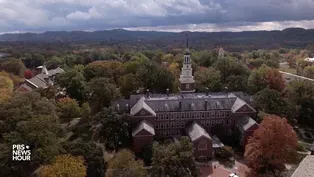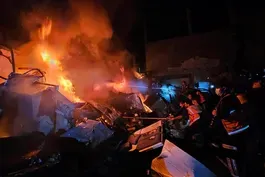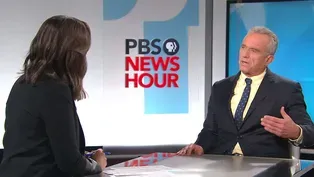
Supreme Court considers domestic violence gun ban case
Clip: 11/7/2023 | 6m 12sVideo has Closed Captions
In domestic violence gun ban case, Supreme Court considers dangers and due process
The Supreme Court heard a case on Tuesday about whether people with domestic violence court orders should be barred from owning guns. Supreme Court analyst Marcia Coyle joins Geoff Bennett to discuss the arguments.
Problems with Closed Captions? Closed Captioning Feedback
Problems with Closed Captions? Closed Captioning Feedback
Major corporate funding for the PBS News Hour is provided by BDO, BNSF, Consumer Cellular, American Cruise Lines, and Raymond James. Funding for the PBS NewsHour Weekend is provided by...

Supreme Court considers domestic violence gun ban case
Clip: 11/7/2023 | 6m 12sVideo has Closed Captions
The Supreme Court heard a case on Tuesday about whether people with domestic violence court orders should be barred from owning guns. Supreme Court analyst Marcia Coyle joins Geoff Bennett to discuss the arguments.
Problems with Closed Captions? Closed Captioning Feedback
How to Watch PBS News Hour
PBS News Hour is available to stream on pbs.org and the free PBS App, available on iPhone, Apple TV, Android TV, Android smartphones, Amazon Fire TV, Amazon Fire Tablet, Roku, Samsung Smart TV, and Vizio.
Providing Support for PBS.org
Learn Moreabout PBS online sponsorshipGEOFF BENNETT: The U.S. Supreme Court heard arguments today in a major case looking at whether people with domestic violence court orders should be barred by a federal law from owning guns.
The case, U.S. v. Rahimi, is the first involving gun rights to come before the nation's highest court since a ruling it issued last year loosening gun restrictions.
Demonstrators gathered outside the court today, stressing the impact the ruling could have on protections for victims of domestic abuse.
We're joined now by our Supreme Court legal analyst, Marcia Coyle.
Marcia, the justices today talked about the history and tradition of gun rights.
How did the two sides navigate that test during the arguments today?
MARCIA COYLE: OK, as you recall, Geoff, in 2022, the court not only -- the conservative majority not only OKed open carry, but did announce this new test.
And the test says that, in order to be constitutional, gun regulations have to be consistent with the historical tradition of gun regulation.
So they're really looking at pre-1900 for either a comparable regulation, not -- doesn't have to be a twin, or a regulation that's a close analog to the regulation that's being challenged.
GEOFF BENNETT: Before the 1900s?
MARCIA COYLE: Yes, history and tradition, yes.
(LAUGHTER) MARCIA COYLE: So we heard a lot about history and tradition today.
The Biden administration has brought this appeal because they lost in the lower court.
And the solicitor general of the United States argued that history and tradition supports the government disarming individuals who are dangerous, although she first used a broader term supports disarming of individuals who are not responsible or not law-abiding.
And she was pressed on the meaning of responsible, because she said that's what's that issue in this particular case.
And she equated it with dangerousness.
And the court did seem to be open to that a bit, because she was able to give some examples from history and tradition of the disarming of people who are mentally ill and committed to institutions, even intoxicated individuals who could be dangerous.
So I think, in general, my sense here is, after the arguments and the justices comments, is that they will uphold the federal law, the federal ban here.
But -- and there will be a focus on dangerousness, the government being able to prove that the individual is dangerous.
But you're not going to see a rewriting of the new test.
They seem to -- the six conservatives still seem quite beholden to it.
So I think it'll be very important exactly what the court says when it writes the opinion as to the effect on other gun laws and also on court cases that are in the pipeline.
GEOFF BENNETT: One concern the conservative justices raised was whether this process of determining whether someone is dangerous, whether that process is fair.
And our team spoke with Clark Neily.
He's with the Cato Institute, a libertarian think tank.
And he actually wrote an amicus brief for Rahimi outlining some of these concerns.
Here's what he said.
CLARK NEILY, Cato Institute: Of course, somebody who really is a domestic abuser should be have their guns taken away, but be kept away from the from their victim, no question about that.
But this law was really poorly written.
The federal law that is being challenged in the Rahimi case allows the federal government to suspend somebody's fundamental right of armed self-defense without any showing ever having been actually made that they are in fact dangerous.
And I think that's a problem.
GEOFF BENNETT: So how did the two sides navigate that specific question?
MARCIA COYLE: Well, the government says that you can show dangerousness.
In fact, Justice Barrett asked her, how do you prove dangerousness?
And she said, well, one of the ways you have is the court order, a judge -- a judicial court order, or there is the legislature.
They have passed laws that define categories of people who may be dangerous and shouldn't have guns, and also consensus; 48 states and territories, she, the solicitor general, said do have these laws.
What Professor Neily was talking about also goes to the issue of fairness and due process.
Some of the justices had questions about the protective orders themselves.
Did they -- were they really temporary?
And Rahimi's lawyer said they're often permanent by default.
And what do you do, one of the justices asked, if you have a, he said/she said situation?
What do you with mutual protection orders?
Those sort of comments were going to the due process issue, fairness and notice.
And, really, that's not an issue in this particular case, although Rahimi's lawyer said it's important to keep that in mind, because his argument is, well, one, there's nothing in history and tradition like this federal ban.
And, two, he said what Congress did here is it bootstrapped a one-sided process, the protective orders, onto a complete denial of a constitutional right.
Geoff, there are other consequences.
Justice Kavanaugh pointed out that background checks do consider protective orders.
And he noted that, in one of the friend of the court briefs, that it was pointed out that, over a 25-year span, 75,000 licenses were denied because the protective order was in the background check.
And the solicitor general also sort of said to the court, we have got to be careful with the language here, because there are courts below that have already struck down the federal ban on possession of guns by felons and the possession of guns that have no serial numbers.
So, there's a lot going on in the lower courts that will eventually come to the Supreme Court.
GEOFF BENNETT: Marcia Coyle, thank you for your insights.
We appreciate it.
MARCIA COYLE: Pleasure, Geoff.
After brutal month, no end to Israel-Hamas war yet in sight
Video has Closed Captions
Clip: 11/7/2023 | 4m 8s | After brutal month, no end to Israel-Hamas war yet in sight (4m 8s)
How would Trump wield power in a 2nd term?
Video has Closed Captions
Clip: 11/7/2023 | 6m 2s | How Trump sees a 2nd term as a chance to promote loyalists and punish critics (6m 2s)
Kentucky college offers education without financial burden
Video has Closed Captions
Clip: 11/7/2023 | 6m 52s | How this Kentucky college offers education without financial burden (6m 52s)
Netanyahu adviser: Israel has ‘no desire to govern’ Gaza
Video has Closed Captions
Clip: 11/7/2023 | 11m 3s | Israel has ‘no desire to govern’ Gaza but will create buffer zone, Netanyahu adviser says (11m 3s)
Robert F. Kennedy Jr. on his run for the White House
Video has Closed Captions
Clip: 11/7/2023 | 9m 34s | Robert F. Kennedy Jr. on why he thinks he has a chance as a third-party candidate (9m 34s)
Survivors return to Kibbutz Be’eri to grieve and rebuild
Video has Closed Captions
Clip: 11/7/2023 | 6m 2s | Lives shattered by Oct. 7 attack, some survivors return to Kibbutz Be’eri (6m 2s)
Providing Support for PBS.org
Learn Moreabout PBS online sponsorshipSupport for PBS provided by:
Major corporate funding for the PBS News Hour is provided by BDO, BNSF, Consumer Cellular, American Cruise Lines, and Raymond James. Funding for the PBS NewsHour Weekend is provided by...

















